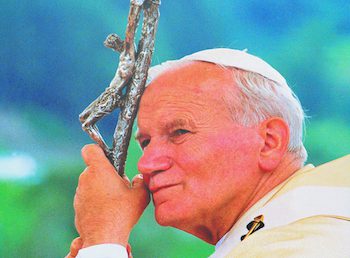The ‘Catholic Guilt’ Canard

This column by the NYT’s Timothy Egan is exactly why so many conservative Catholics cringed at Pope Francis’s recent apostolic exhortation. Excerpts:
I thought of him while reading the latest institution-shifting document from Pope Francis, “Amoris Laetitia” — the Joy of Love. The title sets the tone for the continuation of a quiet revolution. Note that it’s not called the Job of Love, the Duty of Love or the Unbearable Burden of Love. Instead, the pope implies that there’s considerable fun to be had in human relationships. You can even find in its 256 pages a mention of the “erotic dimension” of love and “the stirring of desire.” Yes, sex. The pope approves of it, in many forms.
And while skeptics were disappointed that the latest apostolic exhortation did not change church teachings regarding Catholics who are divorced or in same-sex marriages, the document signals the end for one particular kind of medieval millstone — Catholic guilt, especially in regard to sex.
Right. What excellent words Pope Francis gave us here:
God created man in His own image and likeness: calling him to existence through love, He called him at the same time for love.
God is love and in Himself He lives a mystery of personal loving communion. Creating the human race in His own image and continually keeping it in being, God inscribed in the humanity of man and woman the vocation, and thus the capacity and responsibility, of love and communion. Love is therefore the fundamental and innate vocation of every human being.
As an incarnate spirit, that is a soul which expresses itself in a body and a body informed by an immortal spirit, man is called to love in his unified totality. Love includes the human body, and the body is made a sharer in spiritual love.
Christian revelation recognizes two specific ways of realizing the vocation of the human person in its entirety, to love: marriage and virginity or celibacy. Either one is, in its own proper form, an actuation of the most profound truth of man, of his being “created in the image of God.”
Consequently, sexuality, by means of which man and woman give themselves to one another through the acts which are proper and exclusive to spouses, is by no means something purely biological, but concerns the innermost being of the human person as such. It is realized in a truly human way only if it is an integral part of the love by which a man and a woman commit themselves totally to one another until death. The total physical self-giving would be a lie if it were not the sign and fruit of a total personal self-giving, in which the whole person, including the temporal dimension, is present: if the person were to withhold something or reserve the possibility of deciding otherwise in the future, by this very fact he or she would not be giving totally.
Oh, wait, that was Pope St. John Paul II, in his 1981 apostolic exhortation Familiaris Consortio.

I meant to quote this piece from Pope Francis, which is so unlike his immediate predecessors. In it, the pope explains how human sexuality mimics the relationship of God to His people:
Did Christianity really destroy eros? Let us take a look at the pre- Christian world. The Greeks—not unlike other cultures—considered eros principally as a kind of intoxication, the overpowering of reason by a “divine madness” which tears man away from his finite existence and enables him, in the very process of being overwhelmed by divine power, to experience supreme happiness. All other powers in heaven and on earth thus appear secondary: “Omnia vincit amor” says Virgil in the Bucolics—love conquers all—and he adds: “et nos cedamus amori”—let us, too, yield to love. In the religions, this attitude found expression in fertility cults, part of which
was the “sacred” prostitution which flourished in many temples. Eros was thus celebrated as divine power, as fellowship with the Divine.The Old Testament firmly opposed this form of religion, which represents a powerful temptation against monotheistic faith, combating it as a perversion of religiosity. But it in no way rejected eros as such; rather, it declared war on a warped and destructive form of it, because this counterfeit divinization of eros actually strips it of its dignity and dehumanizes it. Indeed, the prostitutes in the temple, who had to bestow this divine intoxication, were not treated as human beings and persons, but simply used as a means of arousing “divine madness”: far from being goddesses, they were human persons being exploited. An intoxicated and undisciplined eros, then, is not an ascent in “ecstasy” towards the Divine, but a fall, a degradation of man. Evidently, eros needs to be disciplined and purified if it is to provide not just fleeting pleasure, but a certain foretaste of the pinnacle of our existence, of that beatitude for which our whole being yearns.
5. Two things emerge clearly from this rapid overview of the concept of eros past and present. First, there is a certain relationship between love and the Divine: love promises infinity, eternity—a reality far greater and totally other than our everyday existence. Yet we have also seen that the way to attain this goal is not simply by submitting to instinct. Purification and growth in maturity are called for; and these also pass through the path of renunciation. Far from rejecting or “poisoning” eros, they heal it and restore its true grandeur.
This is due first and foremost to the fact that man is a being made up of body and soul. Man is truly himself when his body and soul are intimately united; the challenge of eros can be said to be truly overcome when this unification is achieved. Should he aspire to be pure spirit and to reject the flesh as pertaining to his animal nature alone, then spirit and body would both lose their dignity. On the other hand, should he deny the spirit and consider matter, the body, as the only reality, he would likewise lose his greatness. The epicure Gassendi used to offer Descartes the humorous greeting: “O Soul!” And Descartes would reply: “O Flesh!”. Yet it is neither the spirit alone nor the body alone that loves: it is man, the person, a unified creature composed of body and soul, who loves. Only when both dimensions are truly united, does man attain his full stature. Only thus is love —eros—able to mature and attain its authentic grandeur.
Nowadays Christianity of the past is often criticized as having been opposed to the body; and it is quite true that tendencies of this sort have always existed. Yet the contemporary way of exalting the body is deceptive. Eros, reduced to pure “sex”, has become a commodity, a mere “thing” to be bought and sold, or rather, man himself becomes a commodity. This is hardly man’s great “yes” to the body. On the contrary, he now considers his body and his sexuality as the purely material part of himself, to be used and exploited at will. Nor does he see it as an arena for the exercise of his freedom, but as a mere object that he attempts, as he pleases, to make both enjoyable and harmless. Here we are actually dealing with a debasement of the human body: no longer is it integrated into our overall existential freedom; no longer is it a vital expression of our whole being, but it is more or less relegated to the purely biological sphere. The apparent exaltation of the body can quickly turn into a hatred of bodiliness. Christian faith, on the other hand, has always considered man a unity in duality, a reality in which spirit and matter compenetrate, and in which each is brought to a new nobility. True, eros tends to rise “in ecstasy” towards the Divine, to lead us beyond ourselves; yet for this very reason it calls for a path of ascent, renunciation, purification and healing.
More:
The Prophets, particularly Hosea and Ezekiel, described God’s passion for his people using boldly erotic images. God’s relationship with Israel is described using the metaphors of betrothal and marriage; idolatry is thus adultery and prostitution. Here we find a specific reference—as we have seen—to the fertility cults and their abuse of eros, but also a description of the relationship of fidelity between Israel and her God. The history of the love-relationship between God and Israel consists, at the deepest level, in the fact that he gives her the Torah, thereby opening Israel’s eyes to man’s true nature and showing her the path leading to true humanism. It consists in the fact that man, through a life of fidelity to the one God, comes to experience himself as loved by God, and discovers joy in truth and in righteousness—a joy in God which becomes his essential happiness: “Whom do I have in heaven but you? And there is nothing upon earth that I desire besides you … for me it is good to be near God” (Ps 73 [72]:25, 28).
Thank God the Catholics finally got a pope who doesn’t hate sex, desire, and the erotic dimension of love! Except this was not written by Pope Francis, but by Pope Benedict XVI, in his first encyclical, 2005’s Deus Caritas Est.

To read Egan’s griping, you would think that the Catholic Church was some sort of miserable, ball-busting shrew until Pope Francis published his apostolic exhortation. But look at this:
The pope’s guidance would be a relief to the millions of Catholics living in those newly classified irregular unions, if they ever gave it a second thought. The truth is that a majority of Catholics in Europe and the United States have long since stopped listening to church dictates about sex. A British study in 2013 found that only 1 in 10 regular attendees at Mass felt any guilt over using contraception, long shunned by the church. Evangelical Christians and Muslims were more likely to feel guilt over sexual sins, the survey found.
Well, yeah, but that surely has a lot to do with the rebellion of the masses and the cowardice of many postconciliar Catholic clergy in proclaiming the Church’s teaching. As someone who came into the Catholic Church in the early 1990s, I kept waiting to see the source of all that terrible Catholic guilt I had grown up hearing about. It wasn’t there. I wouldn’t claim that there’s no basis for the myth, and maybe it’s the case that a distorted, overly negative view of sexuality in the past caused an equally distorted backlash in more contemporary times. Point is, “Catholic guilt” about sex is, today, a myth. In my own case, I found the Church’s teaching on sexuality liberating, not because I ever heard a word about it at the parish level (as an adult convert), but because I read the words of John Paul, took them to heart, and began the hard work of changing my life to live by them.
Read the whole Egan column, if necessary; you know exactly what it’s going to say. He is interpreting Francis’s document as being Rome’s surrender to the Sexual Revolution. Whether that’s a fair interpretation of the pope’s words or not is debatable, but it is undoubtedly the case that this is how many commentators on both the Catholic left and the Catholic right are interpreting it, to some extent.
To be sure, it is not fair to blame Francis for the reactions of people who are bound and determined to twist his words to fit their own agendas. But Francis has a habit of making it very easy for Catholic liberals to do just that. I recall the reader of this blog, a teacher of religion at a Catholic high school, who wrote after Francis’s “who am I to judge?” remark on homosexuality. The teacher said that with that, the pope had destroyed all the work he had been doing to explain why the Church teaches what it does about sexuality, including homosexuality. He said his students interpreted Francis’s remarks as saying that it was not the Church’s place to say that there is a moral meaning to homosexual expression (or any sexual expression).
Was that Pope Francis’s intention? I doubt it very much. But he is speaking to a world that does not want to hear what the Church has to say about sex and sexuality. He’s living in a world in which people like Timothy Egan will tell lies about the Catholic Church and what it teaches about sex.
But here’s the thing: no matter how much Catholics take the Egan line, and live by it, they will be guilty. And deep down, they will know it.
Subscribe for as little as $5/mo to start commenting on Rod’s blog.